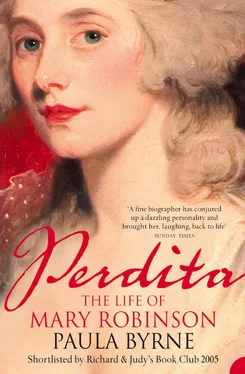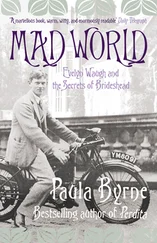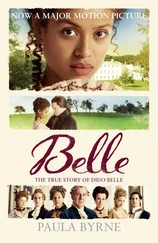Mary was overwhelmed by the Pantheon rotunda: ‘I never shall forget the impression which my mind received: the splendour of the scene, the dome illuminated with variegated lamps, the music, and the beauty of the women, seemed to present a circle of enchantment.’ 5 It was the women who made the strongest impact upon the impressionable young girl, four of them in particular: the celebrated beauty Lady Almeria Carpenter (‘the admiration of the men, and the envy of the women’ 6 ), the actress and singer Sophia Baddeley, Frances Manners the first Countess of Tyrconnel, and Anne Montgomery Marchioness Townshend. Mary was thrilled to be so close to the rich and famous. With a boldness that belies her self-image as a wide-eyed innocent, she took a seat opposite Anne Montgomery, who was flanked by two fashionable admirers. They looked at Mary and one turned to the other and asked ‘Who is she?’
‘Their fixed stare disconcerted me,’ wrote Mary in her Memoirs . ‘I rose, and, leaning on my husband’s arm, again mingled in the brilliant circle.’ One cannot help thinking that this little promenade also had the effect of showing off her frock to its best advantage. The gentlemen set off in pursuit, despite the presence of her husband. As she mingled in the crowd, they asked, ‘Who is that young lady in the pink dress trimmed with sable?’ ‘My manner and confusion plainly evinced that I was not accustomed to the gaze of impertinent high breeding,’ Mary says in the Memoirs , with due propriety, but even in this account written so long after the event – and after the accident that crippled her – one can still sense her pleasure in the power of her looks. 7
She noticed that the men were joined by a third party, whom she recognized as Robert Henley, the son of her godfather, the politician Lord Northington. The latter had died in 1772, so Henley now had the title Lord Northington himself. He approached her, ‘Miss Darby, or I am mistaken?’ 8 She informed him of her change in status and introduced him to her husband, and together they strolled round the rotunda and chatted. Northington asked after her father, and complimented her on her appearance, asking that he be permitted to call on her. A notorious rake and womanizer, he must have been surprised by the transformation of his late father’s lowly godchild Miss Darby into the lovely Mrs Robinson.
Feeling faint with the heat of the rotunda, and fatigued with the promenading, Mary requested tea, but there was not a single seat available in the tearoom. She finally found a sofa near the door, but her husband refused to leave her for a moment, even to bring refreshments. Henley brought her a cup of tea and introduced his two friends, the gentlemen who had been flirting with the Marchioness Townshend before pursuing Mary around the room. They were cousins: Captain George Ayscough and Lord Lyttelton. Both had highly respected fathers: Ayscough senior had been Dean of Bristol Minster during the 1760s when Mary was growing up, while the elder Lyttelton was a distinguished politician and one of Mary’s favourite poets. The sons were not so virtuous: they, like young Northington, were notorious rakes. Lyttelton junior was known as ‘the wicked’ Lord, in contrast to his father, ‘the good’. Mary described him as ‘perhaps the most accomplished libertine that any age or country has produced’. 9
Robinson set off to find the carriage, giving Lyttelton another opportunity to ingratiate himself with Mary by offering the use of his own vehicle. She declined and returned home with her husband. The next morning, the three men called on Mary, whilst she was home alone (it was conventional once an introduction had been made at an evening party to call the next day to enquire after the lady’s health).
Lyttelton was by far the most persistent of the three. In Mary’s version of events, she was entirely the victim of his unwanted attentions: ‘Lord Lyttelton was uniformly my aversion. His manners were overbearingly insolent, his language licentious, and his person slovenly even to a degree that was disgusting.’ 10 But her abhorrence did not prevent her from being drawn into his lordship’s circle. Lyttelton cultivated her husband’s friendship in order to gain access to her. He gave her presents, which she accepted – contrary to the advice of the conduct books on such matters. Among the gifts was the latest volume of poetry by the ‘bluestocking’ Anna Laetitia Barbauld. Lyttelton knew how to flatter Mary’s intellect as well as her beauty.
Mary was beginning to write poetry herself at this time. Barbauld’s poems fired a spirit of emulation: ‘I read them with rapture; I thought them the most beautiful Poems I had ever seen, and considered the woman who could invent such poetry, as the most to be envied of human creatures.’ She added to her praise a wonderfully derogatory and deflating codicil: ‘Lord Lyttelton had some taste for poetical compositions, and wrote verses with considerable facility.’ 11
Lyttelton introduced the couple to his wide acquaintance, cultivating Tom Robinson as a friend and companion. The Robinsons were beginning to rub shoulders with aristocrats, politicians, and actors. Mary met and was dazzled by the intelligent and cultivated Imperial Ambassador the Count de Belgeioso, but was less impressed by the rake Lord Valentia (who later eloped with a courtesan). One of the most controversial figures Mary met during this heady time was George Fitzgerald, an Irish libertine and duellist, known as ‘Fighting Fitzgerald’. Other new acquaintances included an Irish gamester called Captain O’Byrne and the actor William Brereton. The latter would subsequently share the stage with Perdita and marry her childhood friend Priscilla Hopkins.
Lord Northington continued to call and some female friendships were also established – with Lady Julia Yea, a prominent figure in West Country society, and the talented and witty writer Catherine Parry. At a party hosted by Mrs Parry, Mary met the actress Fanny Abington and was captivated by her charm, beauty and exquisite dress sense. Mary began again to harbour dreams of acting.
In the midst of all this socializing, Lyttelton was always at the couple’s side: Mary describes him as her cavaliere servante , a fashionable male companion, a sort of ‘mere Platonic cicisbeo – what every London wife is entitled to’, as Sheridan mockingly wrote in The School for Scandal . But Lyttelton wanted to be more than Mary’s friend and companion. He expected a payoff for the investment he had made in the Robinsons. When he realized that flattery was not the way to her bed, he tried a more perverse route: he insulted her in public and ‘affected great indifference’ in a vain attempt to excite her interest. He mocked her for being young and insipid and when she lost her temper he would apologize for making the ‘pretty child angry’. He would repeatedly call her ‘the child’ in public to humiliate her. He mocked her literary endeavours and her thwarted plans to play Cordelia at Drury Lane. His final resort was to get to her through her weak husband. He embarked upon a strategy of ruination and bankruptcy for Robinson, taking him to gaming houses and brothels, ‘the haunts of profligate debasement’. 12 They were seen often at the races, at Ascot and Epsom.
Whilst Robinson led a riotous life, gambling, drinking, and womanizing with his aristocratic friends, his pregnant wife was left neglected and alone. She missed the counsel of her mother, who had repaired to Bristol with young George to help him recuperate from illness. Mary blamed Lyttelton for the change in her husband’s behaviour. In her Memoirs she said that she reacted by devoting her time to poetry, but this picture of her confined existence devoted to literary pursuits is contradicted by her own claim that ‘Dress, parties, adulation, occupied all my hours.’ 13
Читать дальше












